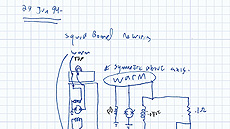Transition edge sensors
 |
| An update to technology more than a century old might be key to making the next big discovery in particle physics. Image courtesy of Blas Cabrera, Stanford University |
This wiring diagram, drawn in 1994, is an early sketch of a concept that might help scientists detect dark matter or discover what happened just after the big bang. It was drawn by physicist Kent Irwin of Stanford University and SLAC National Accelerator Laboratory, about a year into his development of the transition edge sensor.
The TES makes use of a centuries-old concept in particle detection. The cooler a metal is, the better it is at conducting electricity. A particle that hits a metal will give itself away by producing heat and changing the metal's conductivity.
In the late 1800s, American astronomer Samuel Langley created a bolometer, a device that used delicately balanced metals to detect the smallest changes in heat. By 1880, it was sensitive enough to detect the thermal radiation from a cow standing in a field more than a quarter of a mile away. Today, technology based on Langley's bolometer is used in many experiments, including the Planck satellite, which studies patterns in light from the early universe.
Before the TES, scientists spent decades trying to figure out how to build bolometers out of superconducting metal. They did this because every superconductor has a temperature above which its ability to conduct electricity rapidly worsens. Right at this transition temperature, a superconducting metal becomes a superbly sensitive thermometer, making it ideal for use in a bolometer.
However, bolometers operating at this transition temperature also tend to become unstable.
Read more
—Kathryn Jepsen
|